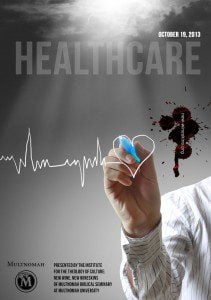 The movie Patch Adams addresses the subject of health care in a holistic manner. The movie is about the story of Hunter D. “Patch” Adams, whose Gesundheit! Institute “is a project in holistic medical care based on the belief that one cannot separate the health of the individual from the health of the family, the community, the world, and the health care system itself.”
The movie Patch Adams addresses the subject of health care in a holistic manner. The movie is about the story of Hunter D. “Patch” Adams, whose Gesundheit! Institute “is a project in holistic medical care based on the belief that one cannot separate the health of the individual from the health of the family, the community, the world, and the health care system itself.”
This statement on the complex connection betwen the health care system and various other forms of health comes through loud and clear in the movie. Adams, played by Robin Williams, claims that if you treat a disease, you may win or lose. However, if you treat a person, you are guaranteed to win regardless of the outcome. According to the movie, Adams gets the nickname “Patch” because he patched up a hole in someone’s cup. Patch wasn’t satsified with fixing only cups. He was concerned for fixing holes in people’s hearts and lives, including their physical health.
One instance of Adams treating the whole person occurs when he follows a group of medical students and their professor on a tour of the university hospital. They stop to analyze the chart/condition of a patient lying on a cart in a hospital hallway without engaging the patient. Adams interrupts the analysis to ask for the patient’s name. The woman lying there is not a lab experiment. She doesn’t simply have a condition. She has a name. His regard for her person changes the atmosphere in the hallway, as he humanizes and personalizes the situation.
What goes on in any health care system reflects and also shapes the state of health of the society at large in various ways. How personal are we in our engagement of people at the checkout counter at a store? Do I look into the eye of the clerk ringing up my purchase, as he or she hands me my receipt? Does the clerk talk to you or ignore you, conversing with a fellow employee? How do we drive down the road? Do we allow a fellow driver to change lanes, or do you and I speed up when we see their turn signal? How do we interact with one another over social media—socially or anti-socially? How healthy are we?
A few weeks ago, a group of my students, their families and I were talking about the upcoming conference we are hosting on health care at Multnomah University’s Institute for the Theology of Culture: New Wine, New Wineskins. One of the student’s wives shared about their major challenge with making payments for recent hospital expenditures concerning one of their children. They have good insurance, but their insurance only covers so much. Even so, I was struck by the wife’s comment: they will be able to figure out a way to handle the various bills, as long as they have friends by their side to walk with them through the ordeal. For example, just having someone close at hand as they sort through the various bills from this and that hospital department is healing. So simple—a personal touch.
As a society, we cannot ignore the plight of people as they try to bear up under the weighty cost of health care in America. We cannot brush the question of affordability aside with a wave of the hand. Still, the sense of touch goes a long way in helping people cope under the burden of the financial strain. As important as medical experts are, we don’t need to be medical doctors like Patch Adams to provide a healing touch. How relationally healthy are we?
************
 On October 19, The Institute for the Theology of Culture: New Wine, New Wineskins will host a conference on healthcare that will address the subject of healthcare from a variety of angles. We invite you to join us for open conversation, learning about the healthcare needs of our community, and efforts to address them. Register for the conference before October 1 to take advantage of early bird rates (just $20 for general public and only $5 for students!). Hope to see you there!
On October 19, The Institute for the Theology of Culture: New Wine, New Wineskins will host a conference on healthcare that will address the subject of healthcare from a variety of angles. We invite you to join us for open conversation, learning about the healthcare needs of our community, and efforts to address them. Register for the conference before October 1 to take advantage of early bird rates (just $20 for general public and only $5 for students!). Hope to see you there!
This piece is cross-posted at The Institute for the Theology of Culture: New Wine, New Wineskins and at The Christian Post.













